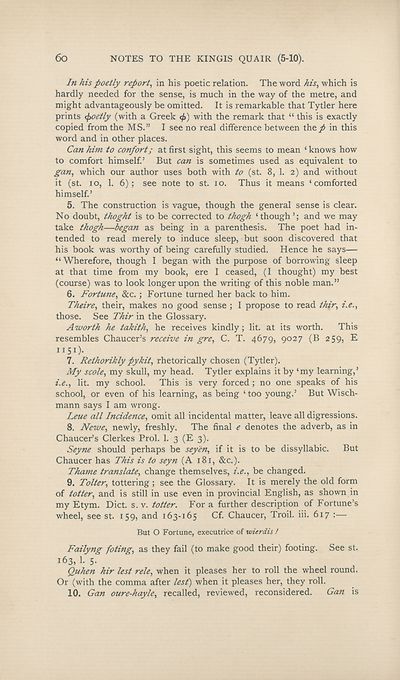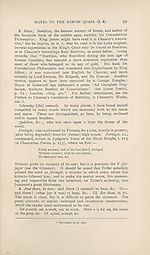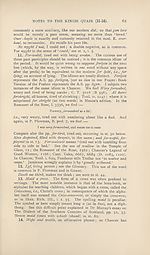Scottish Text Society publications > New series > Kingis quair; together with A ballad of good counsel
(138)
Download files
Complete book:
Individual page:
Thumbnail gallery: Grid view | List view

6o
NOTES TO THE KINGIS QUAIR (5-10).
In his poetly report, in his poetic relation. The word his, which is
hardly needed for the sense, is much in the way of the metre, and
might advantageously be omitted. It is remarkable that Tytler here
prints <f>oetly (with a Greek <f>) with the remark that “ this is exactly
copied from the MS.” I see no real difference between thep in this
word and in other places.
Can him to confort; at first sight, this seems to mean ‘ knows how
to comfort himself.’ But can is sometimes used as equivalent to
gan, which our author uses both with to (st. 8, 1. 2) and without
it (st. 10, 1. 6); see note to st. 10. Thus it means ‘comforted
himself.’
5. The construction is vague, though the general sense is clear.
No doubt, thoght is to be corrected to thogh ‘though’; and we may
take thogh—began as being in a parenthesis. The poet had in¬
tended to read merely to induce sleep, but soon discovered that
his book was worthy of being carefully studied. Hence he says—
“Wherefore, though I began with the purpose of borrowing sleep
at that time from my book, ere I ceased, (I thought) my best
(course) was to look longer upon the writing of this noble man.”
6. Fortune, &c.; Fortune turned her back to him.
Theire, their, makes no good sense ; I propose to read thir, i.e.,
those. See Thir in the Glossary.
Aivorth he takith, he receives kindly; lit. at its worth. This
resembles Chaucer’s receive in gre, C. T. 4679, 9027 (B 259, E
1151).
7. Rethorikly pykit, rhetorically chosen (Tytler).
My scale, my skull, my head. Tytler explains it by ‘my learning,’
i.e., lit. my school. This is very forced ; no one speaks of his
school, or even of his learning, as being ‘ too young.’ But Wisch-
mann says I am wrong.
Leue all Incidence, omit all incidental matter, leave all digressions.
8. Newe, newly, freshly. The final e denotes the adverb, as in
Chaucer’s Clerkes Prol. 1. 3 (E 3).
Seyne should perhaps be seyen, if it is to be dissyllabic. But
Chaucer has This is to seyn (A 181, &c.).
Thame translate, change themselves, i.e., be changed.
9. Tolter, tottering; see the Glossary. It is merely the old form
of totter, and is still in use even in provincial English, as shown in
my Etym. Diet. s. v. totter. For a further description of Fortune’s
wheel, see st. 159, and 163-165 Cf. Chaucer, Troil. iii. 617 :—
But O Fortune, executrice of wierdis !
Failyng foting, as they fail (to make good their) footing. See st.
163, 1. 5.
Quhen hir lest rele, when it pleases her to roll the wheel round.
Or (with the comma after lest) when it pleases her, they roll.
10. Gan oure-hayle, recalled, reviewed, reconsidered. Gan is
NOTES TO THE KINGIS QUAIR (5-10).
In his poetly report, in his poetic relation. The word his, which is
hardly needed for the sense, is much in the way of the metre, and
might advantageously be omitted. It is remarkable that Tytler here
prints <f>oetly (with a Greek <f>) with the remark that “ this is exactly
copied from the MS.” I see no real difference between thep in this
word and in other places.
Can him to confort; at first sight, this seems to mean ‘ knows how
to comfort himself.’ But can is sometimes used as equivalent to
gan, which our author uses both with to (st. 8, 1. 2) and without
it (st. 10, 1. 6); see note to st. 10. Thus it means ‘comforted
himself.’
5. The construction is vague, though the general sense is clear.
No doubt, thoght is to be corrected to thogh ‘though’; and we may
take thogh—began as being in a parenthesis. The poet had in¬
tended to read merely to induce sleep, but soon discovered that
his book was worthy of being carefully studied. Hence he says—
“Wherefore, though I began with the purpose of borrowing sleep
at that time from my book, ere I ceased, (I thought) my best
(course) was to look longer upon the writing of this noble man.”
6. Fortune, &c.; Fortune turned her back to him.
Theire, their, makes no good sense ; I propose to read thir, i.e.,
those. See Thir in the Glossary.
Aivorth he takith, he receives kindly; lit. at its worth. This
resembles Chaucer’s receive in gre, C. T. 4679, 9027 (B 259, E
1151).
7. Rethorikly pykit, rhetorically chosen (Tytler).
My scale, my skull, my head. Tytler explains it by ‘my learning,’
i.e., lit. my school. This is very forced ; no one speaks of his
school, or even of his learning, as being ‘ too young.’ But Wisch-
mann says I am wrong.
Leue all Incidence, omit all incidental matter, leave all digressions.
8. Newe, newly, freshly. The final e denotes the adverb, as in
Chaucer’s Clerkes Prol. 1. 3 (E 3).
Seyne should perhaps be seyen, if it is to be dissyllabic. But
Chaucer has This is to seyn (A 181, &c.).
Thame translate, change themselves, i.e., be changed.
9. Tolter, tottering; see the Glossary. It is merely the old form
of totter, and is still in use even in provincial English, as shown in
my Etym. Diet. s. v. totter. For a further description of Fortune’s
wheel, see st. 159, and 163-165 Cf. Chaucer, Troil. iii. 617 :—
But O Fortune, executrice of wierdis !
Failyng foting, as they fail (to make good their) footing. See st.
163, 1. 5.
Quhen hir lest rele, when it pleases her to roll the wheel round.
Or (with the comma after lest) when it pleases her, they roll.
10. Gan oure-hayle, recalled, reviewed, reconsidered. Gan is
Set display mode to: Large image | Zoom image | Transcription
Images and transcriptions on this page, including medium image downloads, may be used under the Creative Commons Attribution 4.0 International Licence unless otherwise stated. ![]()
| Publications by Scottish clubs > Scottish Text Society publications > New series > Kingis quair; together with A ballad of good counsel > (138) |
|---|
| Permanent URL | https://digital.nls.uk/113909951 |
|---|
| Description | A collection of over 100 Scottish texts dating from around 1400 to 1700. Most titles are in Scots, and include editions of poetry, drama, and prose by major Scottish writers such as John Barbour, William Dunbar, Gavin Douglas, and George Buchanan. Edited by a key scholarly publisher of Scotland's literary history, and published from the late 19th century onwards by the Scottish Text Society. Available here are STS series 1-3. |
|---|

